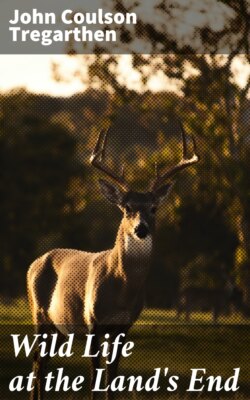Читать книгу Wild Life at the Land's End - John Coulson Tregarthen - Страница 13
На сайте Литреса книга снята с продажи.
CHAPTER IV
The Otter—TRACKING THE WILY VARMINT
ОглавлениеTable of Contents
With the putting aside of the lantern that had lit his way through the winter’s night Andrew’s thoughts turned to the otter. The mystery surrounding the ways of this wild creature drew him to it as buried treasure attracts the spade. “Ah, the varmint!” he used to say, “theere’s no gettin’ to the bottom of un, he’s thet deep and artful. The fox valies hes broosh, but he’s reckless, I tell ee, compared along wi’ the otter. Night and day, the restless varmint’s got a danger signal afore hes eyes.”
The Earthstopper’s words convey some idea of the subtle and wary habits of this nomad of our fauna, which conceals its existence so well that its presence generally escapes observation in districts where it is not hunted.
This is partly due to its having no conspicuous holts like the fox or badger, being content in its wanderings with such lodgings as stone drains, hollow river banks and marshy hovers, all which are as well known to the tribe of otters frequenting a district as wayside camping-grounds are to the gipsies.
In West Cornwall, where the sources of the streams are but four or five miles from the sea, the otters’ quarters by day are, for the most part, crevices and caverns in those mighty granite cliffs that keep watch and ward over the Atlantic.
Thence it sallies out when the twilight of its holt deepens into darkness, to raid the trout, and fearful of couching inland, rarely fails to steal back to its stronghold with the last shades of night, vanishing from moorland and coombe like a spectre before the dawn.
Tactics of this kind, well devised though they are for the creature’s safety, are fatal to sport; and as the meet at the lake drew near, Andrew kept turning over in his mind how he could circumvent them.
To induce an otter to lie up near this favourite fishing-ground, Sir Bevil, who was a keen otter-hunter, gave orders that, to keep the lake quiet, no one but the Earthstopper was to go near it.
He, however, might have been seen there once soon after daybreak, stealing noiselessly round the margin as if he feared to awaken the spirit of the place, bending over the sand of the little bays and the skirts of the marshy ground to find track of the game. Years of such work and the love for his craft had so sharpened his keen, quick eyes that the faintest trace of bird or beast could hardly escape their restless glance. Not, however, until he had made his way round the creeks and crept under the rhododendrons fringing the bank, did he light on the object of his quest.
The footprints were clearly marked on the bare ground beneath the low branches, and impressed the Earthstopper as he stooped to examine them in the sombre light, not so much by their unusual size as by a defect in one of the prints, showing that the middle claw of one forefoot was missing. This would make it easy for him to identify the track and so aid him in finding out whether the otter had gone down the coombe to the sea.
Few sportsmen looking down at the lake, in its setting of wild hills, would dream that the poacher, after its night’s work, would trouble to seek the shelter of some distant sea-cave rather than lie up in the snug reedy hovers skirting the creeks.
